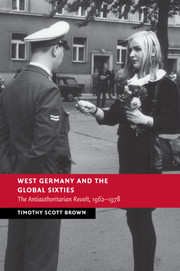Crossref Citations
This Book has been
cited by the following publications. This list is generated based on data provided by Crossref.
HÄBERLEN, JOACHIM C.
and
SMITH, JAKE P.
2014.
Struggling for Feelings: The Politics of Emotions in the Radical New Left in West Germany,c.1968–84.
Contemporary European History,
Vol. 23,
Issue. 4,
p.
615.
Zolov, Eric
2014.
Introduction: Latin America in the Global Sixties.
The Americas,
Vol. 70,
Issue. 3,
p.
349.
Vazansky, Alexander
and
Abel, Marco
2014.
Introduction: what was politics in “1968” in West Germany?.
The Sixties,
Vol. 7,
Issue. 2,
p.
83.
Brown, Timothy Scott
and
Lison, Andrew
2014.
The Global Sixties in Sound and Vision.
p.
1.
Nehring, Holger
2014.
The politics of socialism and the West German “1968”.
The Sixties,
Vol. 7,
Issue. 2,
p.
155.
Brown, Timothy Scott
2014.
1968 in West Germany: the anti-authoritarian revolt.
The Sixties,
Vol. 7,
Issue. 2,
p.
99.
Kümmerling-Meibauer, Bettina
2015.
Children's Literature and the Avant-Garde.
Vol. 5,
Issue. ,
p.
241.
2015.
Metropolitan Preoccupations.
p.
209.
TOMPKINS, ANDREW
2016.
Grassroots Transnationalism(s): Franco-German Opposition to Nuclear Energy in the 1970s.
Contemporary European History,
Vol. 25,
Issue. 1,
p.
117.
Guittet, Emmanuel-Pierre
2016.
West German radical protest in the long 1960s.
Critical Studies on Terrorism,
Vol. 9,
Issue. 1,
p.
150.
Wood, Steve
2017.
Rebranding the Nation: Germany’s Image Politics.
International Politics,
Vol. 54,
Issue. 2,
p.
161.
Koda, Naoko
2017.
Challenging the empires from within: the transpacific anti-Vietnam War movement in Japan.
The Sixties,
Vol. 10,
Issue. 2,
p.
182.
BROWN, TIMOTHY SCOTT
2017.
In Search of Space: The Trope of Escape in German Electronic Music around 1968.
Contemporary European History,
Vol. 26,
Issue. 2,
p.
339.
2017.
Book review symposium: Metropolitan Preoccupations: The Spatial Politics of Squatting in Berlin.
Urban Studies,
Vol. 54,
Issue. 1,
p.
292.
SNEERINGER, JULIA
2017.
Sites of Corruption, Sites of Liberation: Hamburg-St. Pauli and the Contested Spaces of Early Rock'n’Roll.
Contemporary European History,
Vol. 26,
Issue. 2,
p.
313.
von der Goltz, Anna
2017.
Other ’68ers in West Berlin: Christian Democratic Students and the Cold War City.
Central European History,
Vol. 50,
Issue. 1,
p.
86.
Häberlen, Joachim C.
2018.
The Emotional Politics of the Alternative Left.
Prince, Simon
2018.
Against Ethnicity: Democracy, Equality, and the Northern Irish Conflict.
Journal of British Studies,
Vol. 57,
Issue. 4,
p.
783.
Scheuzger, Stephan
2018.
La historia contemporánea de México y la historia global: reflexiones acerca de los “sesenta globales”.
Historia Mexicana,
p.
313.
Martín Álvarez, Alberto
and
Rey Tristán, Eduardo
2018.
La dimensión transnacional de la izquierda armada.
América Latina Hoy,
Vol. 80,
Issue. ,
p.
9.



